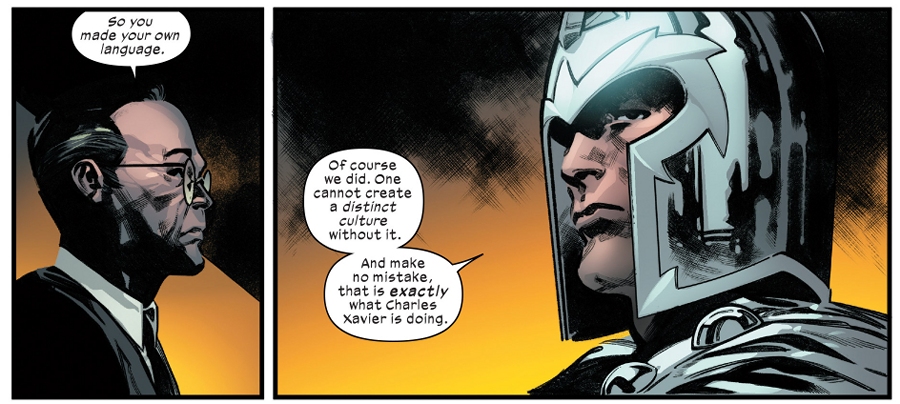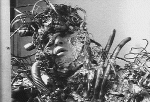I was an avid comics reader for quite some time. I think I stopped some time after “Age of Apocalypse”, but then returned when Marvel tried again to be an “universe”, right at the beginning of “Avengers Disassembled”. I followed everything again up to Civil War, Annihilation and World War Hulk, although I have only actually read the very beginning of Civil War and the rest just sat there in the form of unread physical copies for many years. I’m picking that up from that point right now.
I still believe that the time span between Avengers Disassembled and Civil War (including also the Morrison’s cycle on X-Men that preceded it all) is one of the highest peaks. I like when Marvel works cohesively as an universe and when the single issues contribute to a bigger picture. Avengers Disassembled wasn’t quite a real cross-over, it only provided a vague “theme” that then each writer declined for the specific issue that was being written. With Scarlet freaking out and altering reality, anything went. The story continued linearly in the Avengers title, and only sent ripples across. It was more an experiment than a real deal. With the story concluded, Scarlet was taken away and that specific plot continued on Excalibur, I think. It was generally subdued, but still interesting because it was all in the hands of Claremont, who builds slowly and carefully, as long Marvel lets him and doesn’t break everything.
Avengers Disassembled and the fate of Scarlet then lead directly to House of M, this time a proper event and cross-over, that deeply affected all the other titles. It was the bold hijacking that you expect from the big stories. The strength of House of M was that it didn’t fizzle like it might have. Being some kind of alternate timeline, it could have ended with a reset, and that would have been very disappointing. But instead House of M did what is most important: it produced consequences, it brought real change. The ending itself created some mysteries and subplots that continued right away. It led to titles like “Son of M” that were truly brilliant, radically changed some status quo as with Wolverine, unexpectedly making it even better despite taking away a core feature, it shook the mutant universe through “Decimation” and, more importantly, the whole deal was an instrument to what was coming next: Civil War. This universe was at this time extremely organic and coherent, everything being precisely coordinated and directed toward a common end, and yet free to explore the nuances, breathe in all that potential without any rush. Civil War capped it all by giving more creative freedom to those writers who were bold enough to dare.
The rest is a blank for me, and I haven’t followed at all the “cinematic universe.”
I’ve heard recently about this major reboot of the mutant sub-universe, and especially the ambition of it, and so I decided to read this first issue. …I think it was a bit underwhelming, mostly because it feels very “off.” And because it doesn’t feel fresh either.
The bigger problem is that no one is in-character here. Now I don’t know at what point these characters are, what happened to them in the meantime and how they are changed. I also do not think that Hickman (the writer) isn’t aware of what I’m going to say. There is, obviously, a plan, but from what I’ve read it’s not convincing.
So… What we have here, especially in the light of my past experience, is Magneto. This WHOLE first issue reads *precisely* like Magneto’s wet dream. That’s the first reason why I say it doesn’t feel fresh. We’ve read this type of story many times, because what we see is exactly Magneto’s “manifesto”. That’s why it all pivots around him, with Xavier being the real actor but only in name. It’s Magneto speaking, because this is Magneto’s way of seeing things.
The result of this is a domino of character failures. Xavier isn’t really being shown, because his words would be Magneto’s words. But if we have to believe that this is the “real” Xavier, then everything directly and immediately CONTRADICTS everything we’ve known about Xavier. Because this, being Magneto, is the anti-Xavier. Despite Xavier being, in the story, the supposed origin of what we are witnessing. The problem is: when the first piece has been misplaced, everything else falls apart. The encounter between Cyclops and the Fantastic Four makes sense in service to the story, but it’s not even remotely plausible and coherent with those characters. Whether intended or not, they do feel like puppets.
What’s the deal here? Magneto speaks clearly, and speaks about the whole scenario: this isn’t an offer. It’s not a negotiation. The war has already been won before it even started. The display of power isn’t a threat, it’s just… information. That’s why those guys are being labelled as “plants”. They aren’t agents, they do not make choices. Magneto simply states that mutants are in control, and “thankfully” they are magnanimous.

And this is exactly what Xavier wouldn’t do. In the conflict between Magneto and Xavier, this has always been the central point: Xavier was working toward integration. So it makes sense that it’s Magneto speaking, but it either cancels out Xavier by precisely overlapping, or leaves doubts about this derail. For what end? Xavier being manipulated by this alien plant consciousness is just a too plain idea and doesn’t leave space for an interesting development.
My problem is that the whole thing, across its many parts, is just very simple subversion without having earned it. Xavier converts to Magneto, Cyclops embraces it all. The strength of the X-men, as a sub-culture, was its heterogeneity and diversity (opinions, behaviors, culture). There always were lots of different minds, ideas. The mutant world was always extremely splintered, but also rich. Here instead we end up seeing just automatons. The stereotype of brainwashed robots, who delegate agency to some hive mind. And okay.
Even the brief glimpses to some opposed party is played as a subversion. I’ve read some reviews who claim this whole thing is subtle, but I see nothing subtle in brainwashed automatons and established characters who behave nothing like they should. This mounting feeling of estrangement is deliberate, but leading to something very clear: these are the villains. It’s Magneto doing Magneto, you know? He clearly states they are tyrants now, and there’s nothing that can change this fact. It’s not subtle in any way. The subversion here is that the supposed actual villains get somewhat turned into the good guys, working with salvaged technology from Reed Richards and Tony Stark? What? Even if we also have here some sort of hive mind, creating a dichotomy of plants (mutants) VS computers (humans)… Okay?
I don’t know. Beside all characters being out of character the whole premise seems pretentious in the wrong way, and shallow in its actual substance. This is less a reboot, and more an unjustified betrayal of what came before just for the sake of serving subversion. I guess we’ll have to wait and read the rest to see how much of this “medias res” eventually justifies the present situation, but as it stands now it just read as a poorly written shake-up. Unjustified and not very interesting for what might come next.
I’ve read some reviews, but they do not make any sense to me. They feel like forced praise:
House of X #1 succeeds mainly because it addresses the franchise’s single biggest flaw head-on. It’s been a long time since there was a tangible sense of progress with the story of the X-Men. Grant Morrison’s New X-Men pushed the conflict between humanity and mutants to the next phase by making mutants much more plentiful and creating a ticking time bomb wherein humanity faced its own extinction within a handful of generations. But thanks to House of M, Marvel basically slammed the reset button and returned the focus to mutants as a tiny minority in a world that hates and fears them. It’s probably no coincidence that Hickman directly calls back to Morrison’s work in House of X and creates an even more urgent conflict between humanity and the resurgent mutant race.
Well, duh? It feels like knee-jerk to me, not worldbuilding.
Morrison multiplies mutants, House of M resets, Hickman: nope, they’re back plentiful. This isn’t addressing a big flaw, it’s just disrespecting what was built before, and betraying that very idea that made appreciate Marvel: the coherence of its world. The sense of history, and the work of its creators who kept building aware and embracing what came before. The sense of being organic to something bigger, being in service of it.

